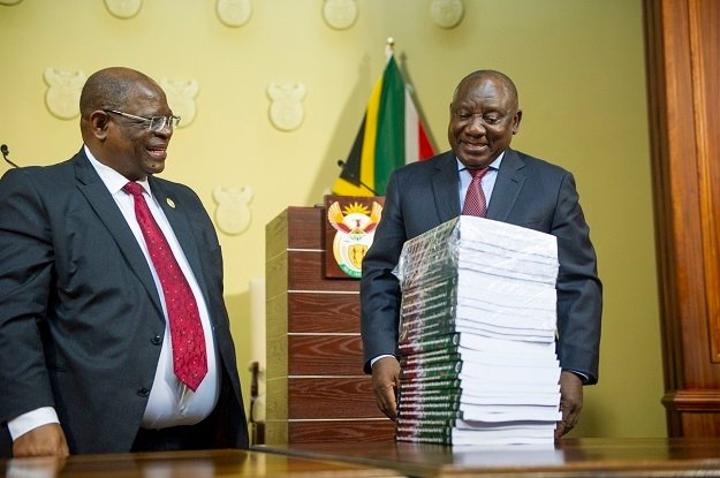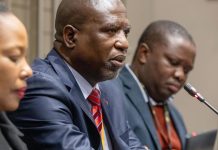Africa-Press – South-Africa. Before the Zondo Commission corruption was well known to exist in South Africa, but the extent of its tentacles and modes of operation were not fully exposed, writes
Omphemetse Sibanda.
“Commissions of Inquiry remind me of a circus. In European films such as Jacques Tati’s Jour de Fete, Gunther Grass’s The Tin Drum and Fellini’s The Clown, we see the excitement and expectation building up in the town, the big parade of clowns, jugglers, and animals.
“Then the show begins. Children are given balloons, members of the audience are invited to come on the stage to take part in some acts, people shout, cry, or clap their hands. Then, the following night, the circus leaves town and disappears without a trace, like a fading star,” said Limieux, invoking the metaphor of a circus in a book by A Mason and D Mullan (eds), Commissions of Inquiry: Praise or Reappraise? Toronto: Irwin Law, 2003.
In South Africa, the circus has just entered the town with the final report handed over to President Ramaphosa on 23 June 2022. I was reminded of the Boswell Wilkie Circus that dropped the curtain in 2001 for its notoriety of bringing joy and laughter to South Africa.
With the closing chapter of the Zondo Commission also grew the notoriety of Professor Thuli Madonsela as the Public Protector whose remedial action triggered the Commission of Inquiry into the Judicial Commission of Inquiry into Allegations of State Capture, Corruption and Fraud in the Public Sector Including Organs of State (State Capture Inquiry or Zondo Commission), and of Chief Justice Zondo as the chairperson of the commission with far-reaching recommendations has been revived.
ALSO READ |
Ebrahim Harvey: Zondo report – ANC in the dock, Ramaphosa faces grave challenges over next six months
Zondo’s report, largely, launched a scathing criticism of the ANC-led government, State-Owned Enterprises, law enforcement agencies, and certain individuals.
The event itself was branded the watershed moment in the history of South Africa because of the large-scale nature of the inquiry. In particular, because it was not only about transactional corruption, but included the capture of the State of South Africa.
Like the circus coming to town, the excitement and expectation were building up in South Africa with journalists descending on the Union Buildings, and political and legal commenters lined up by the media were monumental.
The excitement is continuing to take different directions, with the report itself becoming the eye of the storm to a degree that one still wonders if the Zondo Commission report is destined for the dustbin. Professor Adam Habib writing on News24 raised a concern that the report told us what we really knew.
Criticism of Zondo Commission
The current sharp view and criticism are that the commission has been unfair to the persons who are the subject of unfavourable comments or testimony, cost taxpayers too much; took long to conclude, or is politically biased. There are also those who argue that he conducted the hearings unfairly and that his conclusions in the report were legally unfounded, unreasonable, and unsupported by the evidence.
According to Mr Manyi of the Zuma Foundation, Chief Justice Zondo may be hauled before the Judicial Services Commission (JSC) within the next two days for alleged misconduct in the manner in which he conducted the hearings, reported his findings and made some recommendations.
“President Zuma would request both the courts and the JSC to separately give a serious look into five acts of illegality, breaches of the Constitution and where applicable, the judicial code of conduct,” said Manyi.
So ill-conceived are the Zondo findings and recommendations according to Manyi, that “to say chief justice Zondo is unworthy of being called a judge would be a serious understatement.
Amongst the five (5) things the Jacob Zuma Foundation is crying foul over is that Chief Justice Zondo pronounced on the Arthur Fraser matter when it was sub judice (“under judgment” or “under consideration”) before the Supreme Court of Appeal and that for as long as the matter remains unresolved or undecided by the court it is both unwise and improper for Chief Justice Zondo to have said anything about it. Zondo weighing in on the Fraser matter is thus viewed as an attempt to influence the Supreme Court of Appeal (SCA) by the country’s top judge and Chief Justice of the Constitutional Court.
Suddenly Chief Justice Zondo is dubiously hailed as the author of the history-changing judicial commission into state capture and corruption with a stern rebuke of corrupt activities in South Africa and the the author of a report described by the Zuma Foundation as the fruit of a poisoned tree.
The SCA in 2007 addressing the sub judice rule in Midi Television (Pty) Ltd t/a E-TV v Director of Public Prosecutions (WC) 2007 (5) SA 540 (SCA) stated that, “It is an established rule of the common law that the proper administration of justice may not be prejudiced or interfered with and that to do so constitutes the offence of contempt of court.”
Has Chief Justice Zondo violated the sub judice rule and therefore in Contempt of Court? It is unlikely that Chief Justice Zondo will respond to the five allegations by the Zuma Foundation. His mandate came to an end as an ex-commissioner with the delivery of the final report and who as a sitting judge is subject to serious limitations as to what they can say publicly about the State Capture report.
Recommendations jaw-dropping
Criticisms of the Zondo Commission report are understandable and excusable in some respects. The report is deficit in some parts, and some of the recommendations are jaw-dropping and ridiculously playing into the hand of political hyenas. Commissions of inquiries are expected to provide research and analysis to inform the debate on lasting reform and make recommendations whose implementation will be value add to the society.
The Zondo Commission report, however, may not be as discredited as the Arms Deal Inquiry finding that claims of corruption were “wild allegations with no factual basis”.
The findings were overturned by Gauteng High Court Judge President Dunstan Mlambo as claptrap. A non-profit organisation Open Secrets and Shadow World Investigations had even laid a formal complaint against Judges Willie Seriti and Judge Hendrick Musi with the JSC for alleged “incapacity, gross incompetence or gross misconduct” on how they conducted the Arms Deal Inquiry, which found no evidence of corruption in the multibillion-rand deal.
In parallel, what has happened to recommendations of previous inquiries on corruption in South Africa. The record is at best chequered, with judges in the Arms Deal slated for doing sloppy work and now having to face the JSC for misconduct. It is unlikely that all the Zondo Commission report findings and recommendations will survive the scrutiny of judicial review. But worrying would be a situation where more than half of the findings were to be thrown out as not judiciable.
ALSO READ |
Cyril Ramaphosa: State capture and Covid-19 – A momentous week that promises new beginnings
We must learn something positive from the commission. The country cannot afford to see the continuation of the backsliding in the rule of law, the abuse of power and plundering of state resources. Lack of accountability, corruption, money, power and glory are the enemies of democracy and human rights. Yes, everyone is innocent until proven guilty.
However, this legal principle must not be used to ingrain bad governance which create endless opportunities for democratic deterioration or opportunities ruinous of democracy and order. As correctly reported in the Washington Post, “Many of the institutions investigated were crucial to South Africa’s rebuilding effort after the end of apartheid, its system of white rule, in 1994.” The same institutions are complicit in the destruction of the democratic and accountable South Africa.
Before the Zondo Commission corruption was well known to exist in South Africa, but the extent of its tentacles and modes of operation were not fully exposed. Admittedly, unlike the Fitzgerald Inquiry in Queensland, the corruption exposure by the Zondo Inquiry in South Africa was not complete to a degree that the corruption veins within the state will effectively be destroyed.
I am much aware of comparing naartjies with oranges because the methodology behind Fitzgerald approach in his inquiry was different from that used by Zondo. In conclusion, it is now up to the ANC-led government to ensure that the era of private interests holding illegitimate sway in state and influencing decisions concerning the procurement, entitlements and allocation of resources is buried dead or alive.
– Professor Dr Omphemetse S Sibanda, Legal Scholar Without Borders, is a Professor of Law and the Executive Dean of the Faculty of Management and Law at the University of Limpopo.
For More News And Analysis About South-Africa Follow Africa-Press






